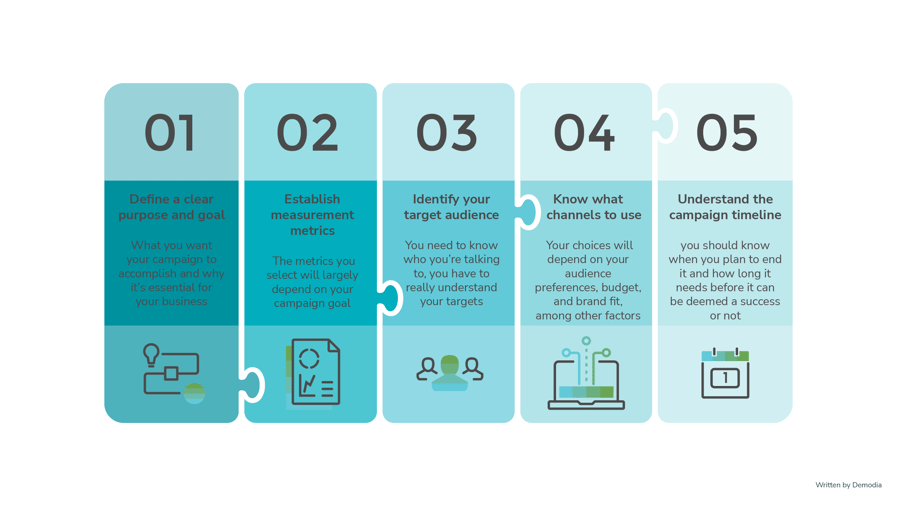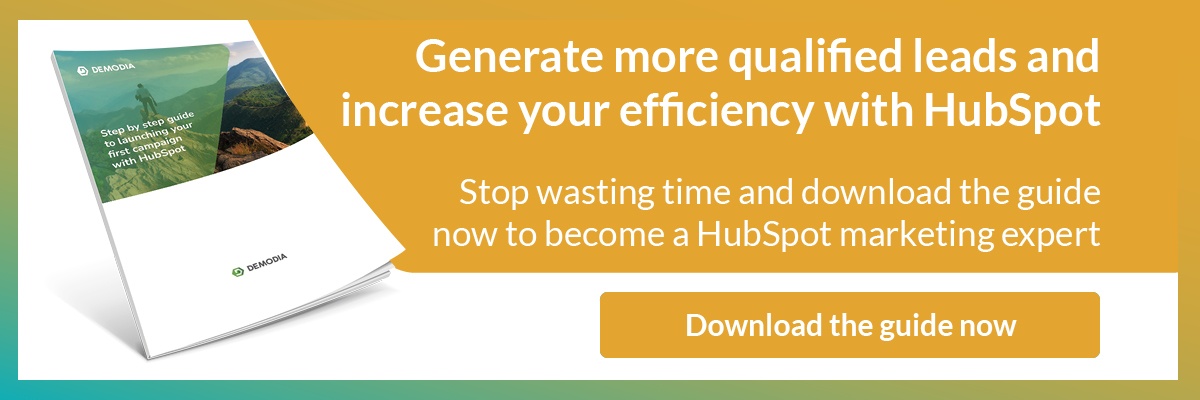
You’re a new HubSpot user and you’re excited to get started. You get stuck in learning as you go along, only to find that your approach simply doesn’t work. You begin to feel discouraged and unsure whether your substantial investment into HubSpot was really worth it.
Sound depressing? This is not an uncommon story in the world of digital marketing. Too many businesses drive right into their first HubSpot campaigns without a decent plan of action or strategy, leading to failure no matter how hard they try. The good news is that all you need is someone to show you what you need to prepare before launch - which is exactly what this blog will reveal.
Read on to find out 5 key things you should know before starting your first HubSpot campaign.

1 - Define a clear purpose and goal
Everyone wants to get more sales, attract more customers and put their name out there, but the best campaigns focus on one specific element. Think about what you want your campaign to accomplish and why it’s essential for your business right now.
Some of the goals you can consider include:
- Promoting a new product or service
- Increasing brand awareness
- Gathering customer feedback or content
- Driving leads
- Generating revenue
- Boosting user engagement
- Advertising an upcoming event
While the above are just a few examples, they should give you an idea of what a campaign can help you achieve.
How HubSpot can help
If you've run campaigns in the past or are using HubSpot for your website, you’ll be able to see metrics on how your customers are engaging with your marketing. From here, you can see where the gaps within your business lie. For example, if you notice that engagement is high but conversions are low, you should consider a campaign that aims to generate revenue. While if you have a low number of leads, you may want to increase brand awareness instead.
2 - Establish measurement metrics
You can launch as many campaigns as you want with as much content as you can muster, but you’ll never know if they’re effective unless you have measurement metrics in place. However, you can’t just record data - you need to generate insights from that data.
Setting out what metrics you need to track ahead of your campaign will enable you to clearly define success and thus structure your campaign to achieve it. Of course, the metrics you select will largely depend on your campaign goal. Here are a few that match the examples above:
- For promoting a new product or service: Pre-orders, sales, upsells
- For increasing brand awareness: Sentiment, social mentions, press mentions
- For gathering customer feedback or content: Social mentions, engagement
- For generating revenue: Leads, sales, upsells
- For boosting user engagement: Blog shares, social shares, email interactions
- For advertising an upcoming event: Ticket sales, vendor or entertainment bookings, social mentions
How HubSpot can help
HubSpot offers a complete customer journey map for every lead that engages with your website. From this, you can see what metrics relate to your customers' actions. This will allow you to actively target specific metrics to influence customer outcomes for your campaign.
3 - Identify your target audience
So many campaigns launch with no response. Marketers end up blaming their content, medium, or even the economy itself. However, the true reason may be the audience you’re trying to talk to.
Before you launch any communication, you need to know who you’re talking to. It’s not enough to simply state “potential customers” - you have to really understand your targets, where they get their information, what sources they trust, their challenges, and what they want to achieve.
You can ask the following questions to identify who your audience is for your campaign:
- Where do my current customers get their information from?
- How did my current customers find my business?
- Where do my potential customers hang out online?
- What kind of content would my customers find useful?
- What challenges does my product solve, and who would typically encounter these challenges?
- What do my customers really want out of my product or service?
Once you figure out the answers to these questions, you’ll be able to provide better content to your customers and plan your campaign around them for a higher likelihood of success.
How HubSpot can help
HubSpot offers a great amount of insight into your customers, their backgrounds, and where they come from. You can use this data to enrich your customer ID processes and tailor your content and campaign approach based on this data. You can create even more personalised messaging and communications as you gain more customers. This is the true power of HubSpot.
4 - Know what channels to use
Content needs to be ready to go before you launch, but you can’t expect to push an entire whitepaper through Facebook statuses, and you can’t expect to reach the CEO of a law firm through Twitter.
This is why identifying the right channels for your campaign is essential to its success and should be identified during the planning phase of your campaign. Your choices will depend on your audience preferences, budget, and brand fit, among other factors.
No matter which channels you choose, try to outline a variety of types, such as:
Paid - Pay per click, display ads, remarketing, paid influencers
Earned - Influencer marketing, PR outreach, bylines
Shared - Social media, forums, referrals
Owned - Your blog, your website, newsletters, email campaigns and social profiles
How HubSpot can help
With the advanced tracking features HubSpot provides, you can see what worked for your previous campaigns or how your current marketing is performing. You’ll know which channels perform the best, which enables you to have a measure of engagement and where your customers can be found.
5 - Understand the campaign timeline
Unless you’re Coca-Cola, you probably don’t have the money to run campaigns forever. Before you even begin your campaign, you should know when you plan to end it and how long it needs before it can be deemed a success or not. This will help you understand when, how and how often you should promote it.
You can visually map this out by determining how long your marketing assets need to influence your customers and where each specific asset can help potential leads become customers. This is where a good understanding of the customer journey comes in, which we’ve covered in a previous blog.
Mark where you plan to launch and end your campaign. From there, work backwards from your campaign launch date. How often can you afford to post and promote your campaign content based on your resources? With this information, you should be able to create a promotional calendar for each marketing channel you intend on using
How HubSpot can help
By utilising the data HubSpot provides on when customers need nurturing and at what point during their journey most customers convert, you can get a good sense of how much content they require at each point of their journey. You can then even use HubSpot during the campaign to automatically send this content at the right time.
Set yourself up for success
If you fail to prepare, you prepare for failure. By having a clear vision for what you want your campaign to achieve, who you want to talk to, and how you want to deliver that campaign, you’ll be making future HubSpot campaigns that much easier.
With so many possibilities, HubSpot can be mind-boggling for beginners. This has led many companies to end up with an expensive email platform that doesn’t return their investment. The key is aligning your tools, processes, and entire team towards the goal of converting new customers. This is why we adopted the HubSpot CRM platform ourselves, which allows us to engage prospects and customers at any stage of the journey in a seamless way. As a HubSpot Gold Partner and one of Europe's leading HubSpot inbound agency partners, we can help you do this too.
Contact us for a quick 30 minute meeting and we can present you with a personalised plan for converting more customers efficiently.



